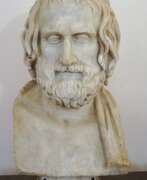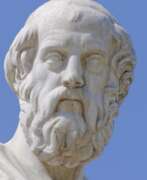5th century BC


Euripides (Ancient Greek: Eὐριπίδης Mνησαρχίδου Φλυεύς) was a tragedian of classical Athens. Along with Aeschylus and Sophocles, he is one of the three ancient Greek tragedians for whom any plays have survived in full. Some ancient scholars attributed ninety-five plays to him, but the Suda says it was ninety-two at most. Of these, eighteen or nineteen have survived more or less complete (Rhesus is suspect). There are many fragments (some substantial) of most of his other plays. More of his plays have survived intact than those of Aeschylus and Sophocles together, partly because his popularity grew as theirs declined — he became, in the Hellenistic Age, a cornerstone of ancient literary education, along with Homer, Demosthenes, and Menander.


Isocrates was an ancient Athenian orator, tutor, and writer.
He was born shortly before the outbreak of the Peloponnesian War (431-404 BC), and the turbulent life of the time directed the young Isocrates to write speeches for court appearances and politicians. His works were a success, and in 390 BC he founded a school whose students included prominent men from all over the Greek world. Isocrates' political beliefs caused a clash of interests with another demagogue, the famous anti-Macedonian Demosthenes (c. 384-322 BC). Moreover, Isocrates' beliefs, which were propagated through his school, also caused quarrels with other prominent figures in Greek philosophy, Plato (428/427-348/347 BC) and later Aristotle (384-322 BC).
Isocrates invested the wealth he had accumulated over time in the Athenian navy, earning him the title of trierarch. Having a reputation as a benefactor of Athens, he strove to be a moral educator as well. His most famous works, including Against the Sophists, Antidozis, Panegyric, To Philip, and Panatheneikus, provided this thinker with recognition from both ancient and modern audiences. The writings of Isocrates are an important historical source of information about the intellectual and political life of Athens in his time.